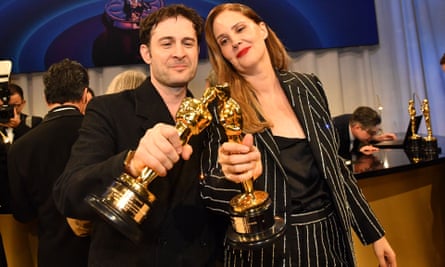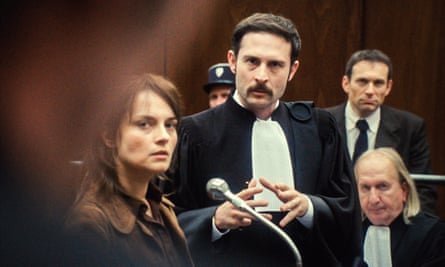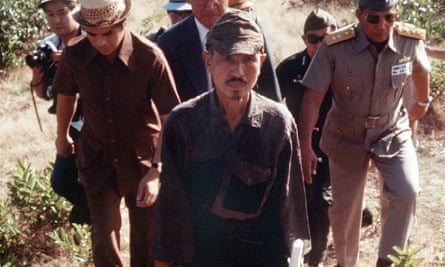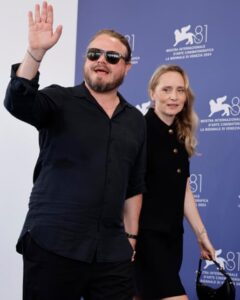Rising French cinema notable Arthur Harari is a film-maker, screenwriter and actor – but the last of these only occasionally, and with reservations. He has also, a touch reluctantly, become highly visible as half of French film’s new “véritable power couple”, according to a recent national edition of Vanity Fair – partner and co-writer to Justine Triet, the director of 2023’s Palme d’Or and Oscar-winning courtroom drama Anatomy of a Fall.
When I meet Harari in a Paris photo studio in June, he is preparing to direct his own third feature but is taking time out to promote a film in which he acts – as it happens, another courtroom drama, this one based on real life.
Directed by Cédric Kahn, The Goldman Case recreates the 1975 trial of Pierre Goldman, a French leftwing militant who had committed a number of robberies but denied the two killings with which he was charged. During an initial prison spell, he had published a memoir of his colourful career (including a spell with a guerrilla cell in Venezuela); by the time of the trial depicted, he was a national celebrity.

Although the case had been somewhat forgotten, Harari knew about it from his parents, both architects who in their day had been Trotskyist militants: “They were in the same organisation as Goldman – the Revolutionary Communist League.”
The figure of the swashbuckling revolutionary criminal and public intellectual is a singularly French hybrid. “It was Goldman’s personality, his life story, his thought – because he really was a thinker – that made him a different kind of criminal,” Harari says. “His voice, his entire personality, is in his book.” It didn’t hurt Goldman’s mythic status that he was also half-brother to a much-loved singing star, Jean-Jacques Goldman.
While Harari’s character, lawyer Georges Kiejman is less flamboyant than the screw-the-system polemicist Goldman, he was a celebrity too. Kiejman would become a minister in François Mitterrand’s socialist government and was lawyer to cinema notables including François Truffaut, Jeanne Moreau and Roman Polanski, as well as the tragically fatedCharlie Hebdo magazine. Harari met Kiejman before his death in 2023 at the age of 90, but he learned the most from footage of him in a 1960s TV mock trial: “He was very different from the way I play him – he was relaxed, calm, ironic, something of a dandy. He wasn’t exactly an actor, but there’s definitely a touch of performance.”

There is certainly plenty of theatre in The Goldman Case, not least provided by a boisterous chorus of courtroom protesters. The mood is more chaotic even than in Anatomy of a Fall, in which everyone present seemed to have free rein to interrupt each other. Despite co-writing Anatomy of a Fall with Triet, Harari says that he himself has only ever spent half an hour in an actual courtroom, briefly dropping in at Paris’s Palais de Justice. But both Anatomy of a Fall and The Goldman Case, he says, reasonably reflect French legal etiquette. “In The Goldman Case, the presiding judge lets things get rowdy, but apparently that’s how it was.”
The two films are examples of a mini resurgence of the courtroom drama in French cinema, along with Alice Diop’s steely Saint Omerand Laetitia Dosch’s considerably larkier French-Swiss canine farce Dog on Trial. “Courtroom drama lets you get to grips with the question of language,” Harari says. “It involves the whole business of justice, identity and politics – the court is a privileged space for dealing with all those themes.”
Harari is serious in manner but much more relaxed than you might suppose from his portrayal of tense, hawkish Kiejman and you can imagine him profitably joining the army of tousled-forelock French actors who regularly get cast as dapper but blase left-bank intellectuals. But acting has been strictly a sideline, with occasional bit parts for Triet: a therapist, a literary critic in Anatomy of a Fall, even a chimpanzee trainer.
He is still getting used to his and Triet’s new celebrity after the success of Anatomy of a Fall: “Everyone recognises Justine in the street now – me not so much, but it happens. We have a certain notoriety – it’s a bit unsettling.” They had fun, he says, on the film’s Oscar campaign, playing up the domestic duo angle for comic effect in interviews, sometimes accompanied on tour by the older of their two daughters, 13 (the younger is five): “She enjoyed the luxury hotels, living the princess life.”
The grandson of actor and stage director Clément Harari, Arthur, 43, studied film at university in Saint-Denis, Paris, and made his first feature in 2016, a crime drama set in the Antwerp diamond world. The cameraman was his brother Tom Harari, a successful name in current French cinema, and his collaborator on numerous Super 8 shorts in their youth.

The follow-up was Onoda: 10,000 Nights in the Jungle, about Hiroo Onoda, the Japanese soldier who refused to recognise that the second world war had ended, hiding out in the Philippines until 1974. It’s a wildly ambitious film – shot in Cambodia, entirely in Japanese, which Harari doesn’t speak – and a compellingly sombre one. Its quixotic intensity has a certain tinge of Werner Herzog – and indeed, the German director had planned to film Onoda’s story before writing a book about him instead. Harari happened to meet Herzog once and got his blessing to film his own version of the story. He laughs, as he tells me the payoff: according to different accounts Harari has heard, Herzog either loved his Onoda, or got bored and stopped watching after 10 minutes.
Both Harari and Triet are known for being politically vocal. Jewish but non-practising, Harari says his identity played a part in his stating his opposition to Israel’s actions in Gaza: “It seemed crucial to speak out as a Jew – even if on some level, I find that a problematic idea, to speak as a Jew.” (Jewish diaspora identity, in fact, plays a prominent role in the courtroom arguments of The Goldman Case.)
And like Triet, Harari has been highly critical of Emmanuel Macron’s government. Triet’s Palme d’Or acceptance speech in Cannes, lambasting his cultural policies, received a hostile reception from authority figures, including France’s minister of culture at the time, who labelled the director ungrateful for the support she had received. “People were incredibly harsh towards Justine – it was quite violent,” says Harari, who is certain that Triet’s forthrightness was the cause of Anatomy of a Fall being controversially snubbed when it came to selecting France’s official Oscars entry in the foreign film category (in the event, it won a more major award, best original screenplay).
Our interview happens in the lead-up to France’s July elections, when the nation appeared to face a triumph of the far right represented by Marine Le Pen’s National Rally. A far-right government was certain to be hostile towards France’s cultural sector and to the system of finance on which French cinema depends. “Culture might seem a trivial concern compared to other possible social or economical effects the National Rally might have,” Harari admits. “So maybe we’re not the worst off – but we’re very afraid.”
A few weeks later, I email Harari for his response to July’s election results, in which a leftwing alliance held the right at bay. He promptly replies at length: he heard the outcome, he says, with “incredulous relief” – but emphasises his enduring distaste for Macron, not least for “exploiting Olympics fever to shore up his own sovereign status”.
Later this year, Arthur starts shooting his third feature as director, co-written with the third Harari brother, Lucas, a successful creator of graphic novels. Starring the indispensable Léa Seydoux, it is titled The Unknown, and unknown is essentially how the film must remain for now. A tantalisingly vaporous official announcement only reveals that it will be “a mix of realistic urban chronicle, fantasy film, investigation, melodrama and daydream”. “I can’t be any more precise,” Harari laughs. “Anything I say could spoil it.”
As for being in front of the camera: “I like acting but I don’t want it to be a major part of my life.” Improbably, given The Goldman Case’s box-office success in France, and a César nomination for best supporting actor, Harari says that he hasn’t had any further acting offers. But as far as he is concerned, that may be just as well: “There’s a bit of a culture of self-satisfaction among French actors – la cour du Roi, quoi” – a dash of Versailles, you might say.
“I realised on The Goldman Case that you have to watch your ego. With my personality, I could easily become very pleased with myself.”
-
The Goldman Case is in UK and Irish cinemas from 20 September
Source: theguardian.com

















